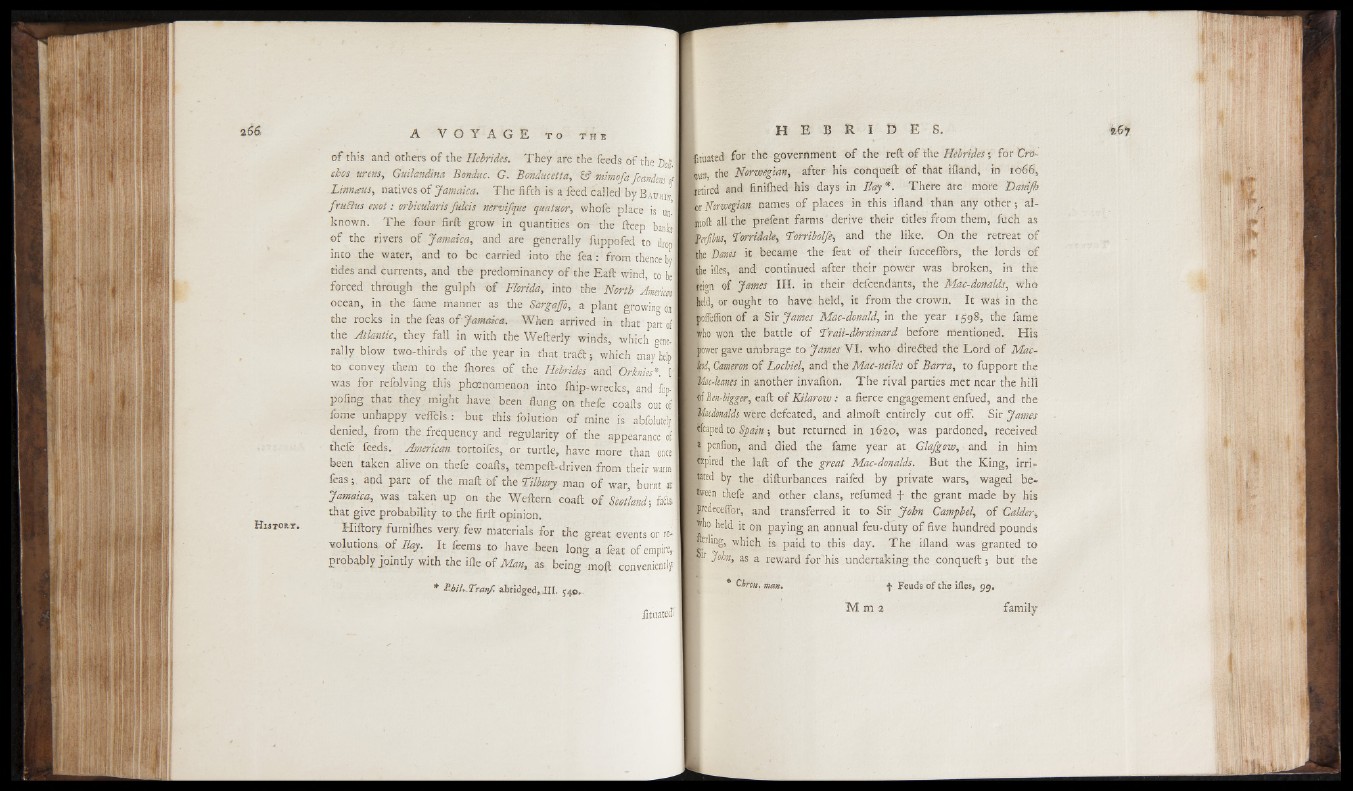
o f this and others of the Hebrides. They are the feeds of the 2) i I
chos amis, Guilandim Bonduc. G. Bonducetta, & mimofa fcandens m
Lirnaus, natives o f Jamaica. The fifth is a feed called by Babhis
fr.uSus exot: orbicularis fulcis nervifquc quatmr, whofe place is Un'i
known. The four firft grow in quantities on the fteep banks i
o f the rivers of Jamaica, and are generally fuppofed to drop i
into the water, and to be carried into the fea: from thence by]
tides and currents, and the predominancy of the Eaft wind, to be!
forced through the gulph -of Florida, into the North ArnicJ
ocean, in the lame manner as the Sargajfo, a plant growino on !
the rocks in the feas of'Jamaica. When arrived in that part o{|
the Atlantic, they fa ll in with the Wefterly winds, which gene-1
rally blow two-thirds of.the year in that trait; which mayhelpfl
to convey them to the ihores of the Hebrides and Orknies*. I
was for refolving this phoenomenon into ihip-wrecks, and fuJ
pofing that: they might have been flung on thefe coafts out oil
feme unhappy veflels,: but this folution- of mine is abfolutely |
denied, from the. frequency and regularity o f the . appearance oil
thefe feeds. American, tortoifes,' or turtle, have more than once!
been taken alive on thefe coafts, tempeft-driven from their warn]
f easand part o f the maft o f the Tilbury man o f war, burnt at
Jamaica, was taken up on the Weftern coaft o f Scotland-, fads,
that give probability to the firft opinion.
Hiftory furnilhes very few materials for the great events or revolutions
of Bay. It feems to have been long a feat of empire,
probably jointly with the ifle o f Man,, as being moft conveniently
* EiiUTratif. abridged, III, 540,
fituated
lituated for the government o f the reft o f tht Hebrides % for Cretan
the Norwegian, after his conqueft of that ifland, in 1066,
letired and finiihed his days in Ilay*. There are more Danijh
L Norwegian names o f places in this ifland than any other; al-
Inoft all the prefent farms derive their titles from them, fuch as
ftrfths, Torridale, Torribolfe, and the like. On the retreat of
Ihe Banes it became the feat of their fuccelfors, the lords of
§ie ifles, and continued after their power was broken, in the
feign of James III. in their defendants, the Mac-dcntalds, who
held, or ought to have held, it from the crown. It was in the
«oiTdlion of a Sir James Mac-donald, in the year 1598, the fame
who won the battle of Trati-dbruinard before mentioned. His
lower gave umbrage to James VI. who direfted the Lord of Mac-
l«i, Cameron of Lochiel, and the Mac-neiks of Barra, to fupport the
ulu-kanes in another invafion. The rival parties met near the hill
If Bin-bigger, eaft of Kilarow: a fierce engagement enfued, and the
Macdonalds were defeated, and almoft entirely cut off. Sir James
«leaped to Spain; but returned in 1620, was pardoned, received
3 penfion, and died the fame year at Glafgow, and in him
|xpired the laft of the great Mac-donalds. But the King, imped
by the difturbances raifed by private wars, waged be-
PKn thefe and other clans, refumed + the grant made by his
IredeceiTor, and transferred it to Sir John Campbel, o f Galder,
I 10 held it on paying an annual feu-duty o f five hundred pounds
Ifriing, which is paid to this day. The ifland was granted to
l r J^:n> as a reward for'his undertaking the conqueft; but the
* Chrn, man. f Feuds of the ifles, 99.
M m 2 family